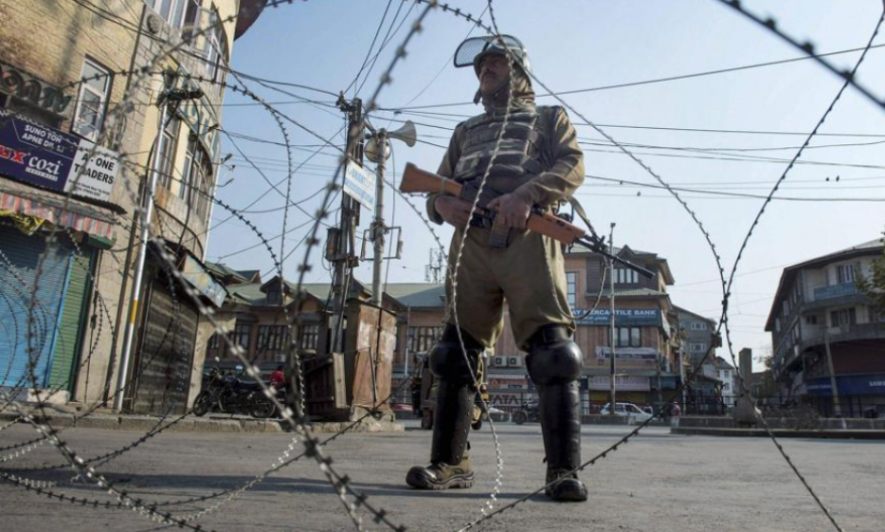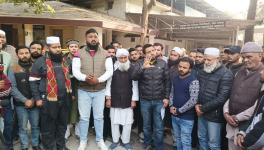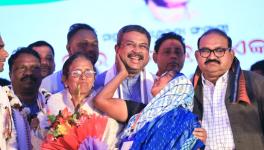Towards a Political Paradise of Caged Parrots

The politics of Kashmir has a long history of suppression of voices. The author examines this in the current political scenario of arresting political opponents and locking up local political discourse to maintain a singular narrative, one that is sponsored by Delhi.
In Gun Island, Amitav Ghosh writes, “People think that knowing the future can help you prepare for what is to come – but often it only makes you powerless.”
After the reading down of Article 370, as the edifice of the ‘new’ Jammu and Kashmir has begun to be constructed in accordance with the blue-print of tweaked laws, lending some insights into the near future, the overwhelming feeling is not of curiosity but of being disempowered – socially, politically and economically.
Ideally in a democracy, political power flows two ways, from the masses to leaders and vice versa, and is intrinsically linked to social and economic empowerment. In the case of Jammu and Kashmir, due to its conflict and unique history, the former always trickled down through filters imposed by New Delhi. History bears testimony to deposed governments, jailed leaders, rigged elections and manipulated politics in ways that are as yet unfamiliar in other parts of the country. As mainstream politics had long back been reduced to governance matters, people’s empowerment was punctured with many breaches.
Yet, two streams of political narratives, commonly classified as separatist and mainstream politics, continued to breathe through the last seven decades until August 5, 2019. Hours before the state was to lose its special status and be sliced up into two downgraded union territories, all political voices, barring those affiliated to the ruling BJP, were put in fetters, literally so, as hordes of political leaders including three former chief ministers and workers were arrested or put under house arrest, as part of the massive restrictions and lockdown imposed to create an enabling climate for deciding the future of the people of the state without their involvement.
In one stroke, the Government of India blurred the line between separatist and mainstream politics – everybody tarred in the same ‘anti-national’ brush.
The method was the first sign of the destruction of whatever little political empowerment had survived in the seven decades. The experiment implied the complete annihilation of political power that flowed from mainstream politics. The incarceration of politicians, though prolonged, may have been temporary, barring for some who are yet to be released or have been fortified inside their own homes under unofficial ‘house arrests’. But political discourse as it was known to exist perished forever. Three reasons: One, that the state had been geographically sliced which meant that its political cartography would be chiseled down too. Second, it had been demoted to two union territories – one with no legislature and the other with a legislature whose powers would be curtailed and restricted to municipal matters. Third, and most importantly, the new rules of engagement entailed that speaking and political dissent are crimes.
The politics of Jammu and Kashmir in the last more than 70 years has been largely Kashmir centric. For a year, the Valley has been shrouded in silence. On the face of it, the floating of a new political formation carved out of ‘deserters’ and recent murmurs from National Conference, primarily Omar Abdullah’s latest interviews, may suggest that the gates are being opened for resuming a political process and reclaiming some of the lost ground. The very articulation of this politics reflects the contrary.
The former chief minister and National Conference (NC) leader who spent more than seven months inside a make-shift jail in Srinagar has recently spoken about his sense of betrayal and bitterness. He reiterated his resolve to fight back politically but will not contest elections till restoration of statehood status, while skirting at least a part of Ladakh region. More glaringly, he left the issue of Article 370 to litigation already pending before the Supreme Court.
Omar Abdullah’s break from silence with cautious dumping of Article 370 has raised eyebrows locally at a time when the rumours have begun to rend the air that the statehood of J&K (whatever its geographical shape) would be restored. Four months after his release, are these remarks part of an orchestrated Delhi-made design or are they a tactical move to adjust to the new rules in which politics could be framed?
Many of the Kashmiris released from jails in the last one year were freed after signing bonds that forbid them from talking about Article 370 or participating in protests. This was also confirmed by Iltaja Mufti, daughter of the former chief minister Mehbooba Mufti who is yet to be released, though in April she was shifted from sub-jail and is presently under house-arrest. In an interview to Indian Express on July 29, she said:
“In October straight off she was told to sign a bond. An official took the bond to her. If you read it, you will feel like you are in a dictatorship. Literally, (it would have meant) that (she) can’t speak about anything that happened. Without getting into too many details, it is kind of understood that if she wants to get out, her freedom is contingent on her not talking about Article 370.”
A day after the interview, the government extended Mehbooba’s PSA detention for another three months.
It is irrelevant what inspired Omar Abdullah. Whether it is a case of succumbing to New Delhi’s pressures or trying to reclaim and maximise his political space in accordance with the emerging realities, the decision to drop Article 370 from the political discourse reveals the absence of choice. The writing on the wall is clear: Speak and be persecuted. Acceptance of Article 370 abrogation as fait accompli is the necessary condition for any political business, irrespective of the fact that there can be no gags on discussing and critiquing a constitutional statute that once existed.
The dilution in Omar’s stand gels with National Conference’s history of shifting from plebiscite to autonomy. As more space is being conceded, uncontested, to New Delhi in that journey, has statehood replaced autonomy? History of J&K is one of broken promises and also one of reconciling to the betrayals. In that sense things may not have changed. Another thing that remains constant – as always, mainstream politics would remain limited to elections which have always been wrongly perceived as the sole measure of democracy.
Yet, the situation today is very different.
Much of J&K’s autonomy was eroded way back in the 1950s and 1960s. What remained was a hollow shell but a significant one. Despite being denuded, Article 370 offered to J&K’s citizens certain privileges with respect to jobs, admissions in educational institutions and land ownership; and, also maintained the sanctity of the only Muslim majority state, its asymmetric federal relation with rest of India and its uniqueness.
The difference between hollowing out Article 370 and fully striking it out highlights the difference between the ideological positions of the rulers that time and now. The former was compelled by insecurities with respect to Muslim majority status of Kashmir and its historic dispute, the latter also by its contempt for Muslims. While the former hoped to protect Kashmir’s demographic profile and showcase it as the totem of India’s secularism, a Muslim majority state is an eye-sore in the latter’s political vision of the country.
This difference is important to understand how J&K’s politics from hereon will shape, not only as a continuum of the past but also incongruous to it. As local political discourse will be completely locked up, BJP government’s liberal policy of opening the doors of the erstwhile state to outsiders for jobs and purchase of land and settlement, resulting in a gradual demographic change, and coupled with the delimitation of constituencies, will also signal the end of Kashmir-centric politics. Jammu region’s historic political vacuum and the now deepening anxieties of demographic flooding, despite some whimpers of political rhetoric, will enable New Delhi to exercise absolute power by design or default.
The calculated over-lapping of the date for a major ceremony for proposed Ram temple construction and Article 370 abrogation’s first anniversary also indicates the fusion of toxic religious idioms and politics. Both have been long cherished dreams of the Hindutva project.
In this scenario, the only purpose any faux political flags in J&K, limited within the confines of the clearly defined red lines, will serve is to legitimise New Delhi’s farce of restoring democracy, and will also be an endorsement of its Hindutva agenda.
A leaf from the past may be instructive for the enthusiasts. In 1996, the National Conference brought autonomy out of its bag to blunt the edges of separatist politics and the popularity of the armed rebellion. Its autonomy report and an assembly resolution presented to the Centre back then never even received a response. Its veiled call for statehood now may leave it just as empty-handed. But even if statehood is hypothetically to be restored, political power is measured not by the powers enjoyed by a chief minister but by the capacity to formulate political discourse and freely articulate it; also by the ability to win some level of public-trust.
In that sense, mainstream politics is dead and only waiting to be buried. Everything else is just a caged parrot which speaks impressively but only what it is trained to speak.
(Anuradha Bhasin is a journalist based in Jammu and the Executive Editor of Kashmir Times. Views expressed are personal.)
Get the latest reports & analysis with people's perspective on Protests, movements & deep analytical videos, discussions of the current affairs in your Telegram app. Subscribe to NewsClick's Telegram channel & get Real-Time updates on stories, as they get published on our website.























